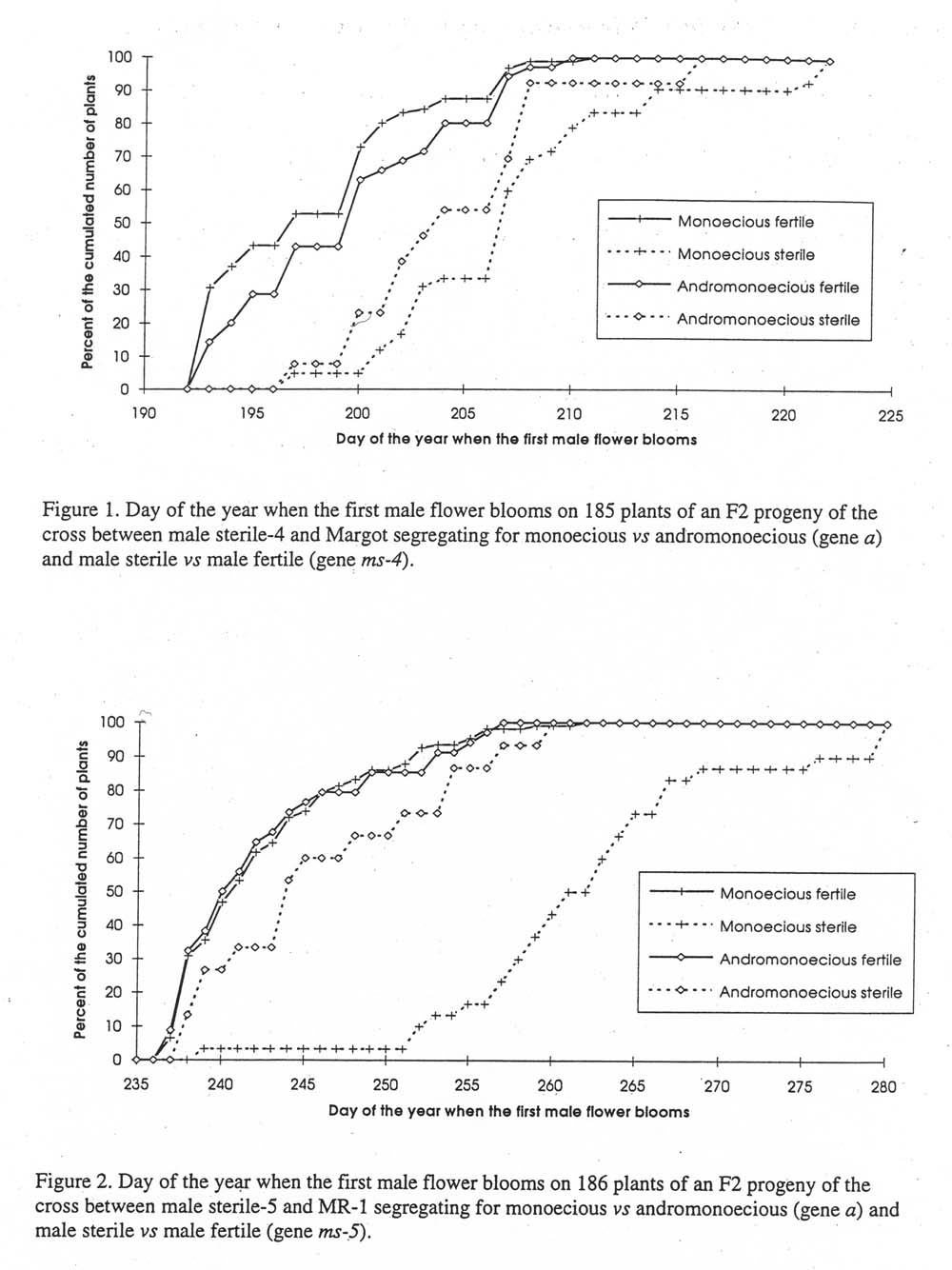Cucurbit Genetics Cooperative Report 18:38-39 (article 18) 1995
M. Pitrat
INRA, Station d’ Amelioration des Plantes Maraicheres, B.P. 94, 84143 Montfavet cedex (France)
In the original male sterile-4 mutant (ms-4) of Cucumis melo the first male flowers turn yellow at bud stage (when the flower is about 1-2 mm) and do not open (2). The abortion of the male flowers is very clear on young plants. When the plants are older, the male flowers do not drop at an early stage; the corolla opens and the anthers are very small with no viable pollen indicating a true male sterility. This line is also monoecious. A across between this monoecious male sterile line and an andromonoecious male fertile line (‘Margot’ of Charentais type) has made and 185 F2 plants were studied. Plants were grown in soil under a greenhouse in good growing conditions so that the flower yellowing and abortion cannot be explained by irrigation or nutritional stresses. The flower types have been noted (monoecious vs andromonoecious and male fertile vs male sterile) and also the day when the first male flower was blooming.
As expected, segregations correspond clearly to monogenic controls (3:1 segregation): monoecious vs andromonoecious (gene a: X2 = 0.888, Prob = 77%) and male-fertile vs male sterile (gene ms-4: X2 = 2.207, Prob – 14%). These two genes are independent (X2 = 2.512, Prob = 47%) as already described (3). The first male flowers bloom much more later on the sterile monoecious [a+ ms-4](Fig. 1). The difference is significant at the 1% level according to the Kolmogorov-Smirnov two-sample test. But there is also a difference among the sterile andromonoecious [a ms-4] and the fertile andromonoecious [a ms-4+ ]. The monoecious sterile [a+ ms-4] blooms later than the andromonoecious sterile [a ms-4] but the difference is not significant.
The same study has been conducted using the male sterile-5 mutant (ms-5) (1). An andromonoecious male sterile line has been crossed with a monoecious fertile line (MR-1) and 186 F2 plants have been observed under greenhouse. No distortions of segregation have been observed: the observed segregations fit well with 3:1 segregation for monoecious vs andromonoecious (gene a:X2 = 0.179, Prob = 67%) or male fertile vs male sterile (gene ms-5: X2 = 1.737, Prob = 63%). As in the case of ms-4 there are no differences between the Andromonoecious fertile [a ms-5+ ] and the monoecious fertile [a+ ms-5+ ] plants for the date when the first male flower blooms (Fig. 2). But there is a very strong difference for the monoecious sterile [a+ ms-5] plants which bloom much more later than the andromonoecious sterile [a ms-5] plants (significant at the 1% level according to the Kolmogorov-Smirnov two-sample test).
In conclusion there is an interaction between monoecy and male sterility. This interaction is very clear in the case of ms-5: the [a+ ms-5] plants exhibit an abortion of the first male flowers and the male flowers bloom about 15 days later than on [a ms-5+ ], or [a+ ms-5+ ] plants. The interaction between a and ms-4 is not as clear even if there is the same tendency.
Figure 1. Day of the year when the first male flower blooms on 185 plants of an F2 progeny of the cross between male sterile-4 and Margot segregating for monoecious vs andromonoecious (gene a) and male sterile vs male fertile (gene ms-4).
Figure 2. Day of the year when the first male flower blooms on 186 plants of an F2 progeny of the cross between male sterile-5 and MR-1 segregating for monoecious vs andromonoecious (gene a) and male sterile vs male fertile (gene ms-.5).

Literature Cited:
- Lecouviour M., M. Pitrat and G. Risser. 1990. A fifth gene for male sterility in Cucumis melo. Cucurbit Genetics Coop. Rept. 13:34-35.
- Lozanov P. 1983. Selekcija na mazkosterilni roditelski komponenti za ulesnjavana na proizvodstvoto na hibridni semena ot papesi. Dokl. na parva naucna konferencija po genetika i selekapa, Razgrad.
- Pitrat M. 1991. Linkage groups in Cucumis melo L. J. Hered. 82-406-411.